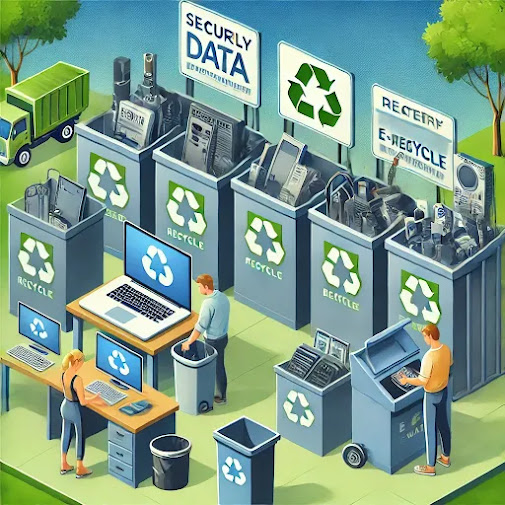Safe & Proper Ways to Recycle Computers & Electronics
Recycling Computers and Electronics Safely and Properly
As technology advances, outdated computers and electronics pile up, contributing to global e-waste. Proper disposal is essential for environmental protection and data security. Many electronic components contain hazardous materials such as lead, mercury, and cadmium, which can contaminate soil and water if not handled correctly. Here’s how to recycle electronics responsibly.
 |
| A visually engaging digital illustration showing the safe recycling process of computers and electronics. |
1. Back Up & Wipe Your Data
Before recycling, it’s crucial to protect your personal information. Back up important files to an external hard drive or cloud storage. Then, securely wipe the device using data erasure software like DBAN (Darik's Boot and Nuke) or factory reset options on smartphones and tablets. For added security, consider physically destroying the hard drive to prevent data theft.
2. Repurpose or Donate
If the device is still functional, consider repurposing it for a different use. Older computers can be used as media centers, home servers, or even for educational purposes. Alternatively, donate your electronics to schools, charities, or refurbishing programs such as Computers with Causes or The National Cristina Foundation. These organizations refurbish old electronics and provide them to those in need, extending the device’s lifecycle and reducing e-waste.
3. Find Certified E-Waste Recyclers
Not all recycling centers handle electronics responsibly. Look for certified recyclers who follow ethical and sustainable disposal practices. R2 (Responsible Recycling) and e-Stewards certifications ensure that recyclers follow strict environmental and data security standards. You can locate certified recyclers through websites like Earth911 or Call2Recycle.
4. Use Manufacturer Take-Back Programs
Many electronics manufacturers offer take-back and trade-in programs for old devices. Companies like Apple, Dell, HP, and Samsung provide convenient recycling options, sometimes offering store credit or discounts on new purchases. These programs ensure that electronic waste is handled responsibly, with components either refurbished or safely broken down for raw materials.
5. Dispose of Batteries Separately
Batteries, particularly lithium-ion and lead-acid types, require specialized recycling due to their hazardous materials. Never toss them in the trash, as they can cause fires or environmental damage. Many retail stores, including Best Buy, Staples, and Home Depot, offer drop-off stations for battery recycling.
6. Recycle Accessories & Cables
Chargers, cables, and peripherals like keyboards and mice often contain valuable materials such as copper and aluminum. Instead of discarding them, drop them off at e-waste recycling centers or donation programs. Some tech companies accept old accessories for responsible recycling, preventing these smaller items from contributing to e-waste.
7. Avoid Landfills & Illegal Dumping
E-waste accounts for a significant portion of landfill waste, posing environmental risks due to toxic elements leaching into the ground. Illegal dumping of electronics can lead to heavy fines and legal consequences. Always dispose of electronics through authorized channels to prevent pollution and protect ecosystems.
8. Consider Repair & Upgrading
Before replacing your device, consider upgrading components or repairing faulty parts. Replacing a hard drive, adding more RAM, or updating software can extend a computer’s lifespan. Many repair businesses and online resources, such as iFixit, offer tutorials for fixing common electronic issues, reducing the need for new purchases.
9. Sell or Trade-In for Reuse
If your electronics are still in working condition but no longer needed, consider selling them through platforms like eBay, Craigslist, or Facebook Marketplace. Trade-in programs from retailers like Amazon and Best Buy allow you to exchange old devices for gift cards or store credit, ensuring they are either resold or recycled responsibly.
10. Participate in Community E-Waste Collection Events
Many cities and communities host e-waste collection events where residents can drop off old electronics for safe disposal. Check with your local government, environmental agencies, or electronic retailers for upcoming collection events in your area. These events often partner with certified recyclers to ensure ethical disposal practices.
By following these steps, you can minimize e-waste and contribute to a more sustainable future. Always check local e-waste recycling options and support responsible tech disposal practices. Reducing electronic waste is a collective effort, and every small step towards proper recycling makes a difference for our planet.









Comments
Post a Comment